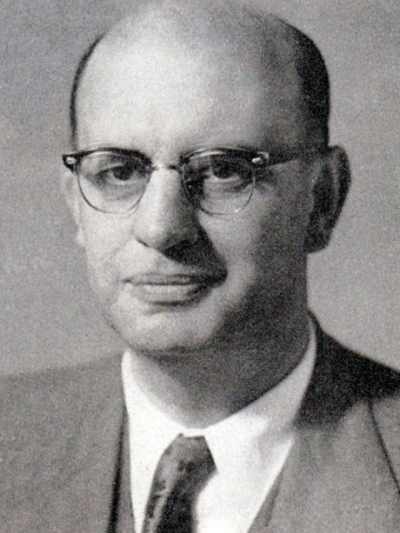Hendrik Frensch Verwoerd ([frvurt]; 8 September 1901 6 September 1966) was a South African politician, a scholar of applied psychology and sociology, and chief editor of Die Transvaler newspaper. He is commonly regarded as the architect of Apartheid. Verwoerd played a significant role in socially engineering apartheid, the country's system of institutionalized racial segregation and white supremacy, and implementing its policies as Minister of Native Affairs (19501958) and then as prime minister (19581966). Furthermore, Verwoerd played a vital role in helping the far-right National Party come to power in 1948, serving as their political strategist and propagandist, becoming party leader upon his premiership. He was the Union of South Africa's last prime minister, from 1958 to 1961, when he proclaimed the founding of the Republic of South Africa, remaining its prime minister until his assassination in 1966.
Verwoerd was an authoritarian, socially conservative leader and an Afrikaner nationalist. He was a member of the Afrikaner Broederbond (Afrikaans: Brotherhood), an exclusively white and Christian Calvinist secret organization dedicated to advancing the Afrikaner "volk" interests, and like many members of the organization had verbally supported Germany during World War II. Broederbond members like Verwoerd would assume high positions in government upon the Nationalist electoral victory in 1948 and come to wield a profound influence on public and civil society throughout the apartheid era in South Africa.
Verwoerd's desire to ensure white, and especially Afrikaner dominance in South Africa, to the exclusion of the country's nonwhite majority, was a major aspect of his support for a republic (though removing the British monarchy was long a nationalist aspiration anyway). To that same end, Verwoerd greatly expanded apartheid. He branded the system of apartheid as a policy of "good-neighborliness", stating that as different races and cultures have different beliefs and values, they could only reach their full potential if they lived and developed apart from each other, avoiding cultural clashes.. He further advocated that the white minority had to be protected from the majority non-white in South Africa by pursuing a "policy of separate development"namely apartheidand keeping power firmly in the hands of whites, to whom he gave credit to South Africa's economic development. Given Verwoerd's background as a social science academic, he attempted to justify apartheid on ethical and philosophical grounds. This system however saw the complete disfranchisement of the nonwhite population.Verwoerd heavily repressed opposition to apartheid during his premiership. He ordered the detention and imprisonment of tens of thousands of people and the exile of further thousands, while at the same time greatly empowering, modernizing, and enlarging the white apartheid state's security forces (police and military). He banned black organizations such as the African National Congress and the Pan Africanist Congress, and it was under him that future president Nelson Mandela was imprisoned for life for sabotage. Verwoerd's South Africa had one of the highest prison populations in the world and saw a large number of executions and floggings. By the mid-1960s Verwoerd's government to a large degree had put down internal civil resistance to apartheid by employing extraordinary legislative power, draconian laws, psychological intimidation, and the relentless efforts of the white state's security apparatus.
Apartheid as a program began in 1948 with D. F. Malan's premiership, but it was Verwoerd's role in its formulation and his efforts to place it on a firmer legal and theoretical footing, including his opposition to even the limited form of integration known as baasskap, that have led him to be dubbed the "Architect of Apartheid". His actions prompted the passing of United Nations General Assembly Resolution 1761, condemning apartheid, and ultimately leading to South Africa's international isolation and economic sanctions. On 6 September 1966, Verwoerd was stabbed several times by parliamentary aide Dimitri Tsafendas. He died shortly after, and Tsafendas was jailed until his death in 1999.
The prime minister of South Africa (Afrikaans: Eerste Minister van Suid-Afrika) was the head of government in South Africa between 1910 and 1984.

1966Sep, 6
Prime Minister Hendrik Verwoerd, the architect of apartheid, is stabbed to death in Cape Town, South Africa during a parliamentary meeting.
Choose Another Date
Events on 1966
- 10Mar
Buddhist Uprising
Military Prime Minister of South Vietnam Nguyễn Cao Kỳ sacked rival General Nguyễn Chánh Thi, precipitating large-scale civil and military dissension in parts of the nation. - 6Jul
Hastings Banda
Malawi becomes a republic, with Hastings Banda as its first President. - 10Jul
Martin Luther King, Jr.
The Chicago Freedom Movement, led by Martin Luther King, Jr., holds a rally at Soldier Field in Chicago. As many as 60,000 people attend. - 14Oct
Montreal Metro
The city of Montreal begins the operation of its underground Montreal Metro rapid transit system. - 8Nov
Reconstruction Era
Former Massachusetts Attorney General Edward Brooke becomes the first African American elected to the United States Senate since Reconstruction.

 English
English  español
español  français
français  português
português  русский
русский  العربية
العربية  简体中文
简体中文 